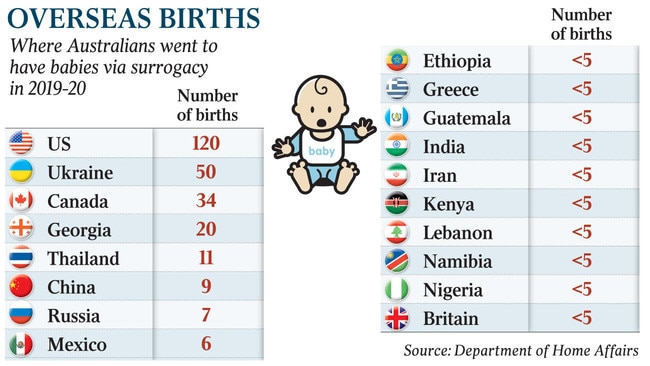Call for onshore surrogate births to reduce risks
Nigeria, Namibia, Lebanon, Guatemala and Mexico have emerged as surrogacy destinations for Australian intended parents.
Nigeria, Namibia, Lebanon, Guatemala and Mexico have emerged as surrogacy destinations for Australian intended parents, prompting calls for legal changes to ensure more babies are born via surrogacy locally than in higher-risk countries.
Department of Home Affairs figures show 275 babies born overseas via surrogacy arrangements were granted Australian citizenship in 2019-20.
This is up from 232 the previous year and the highest number on record — eclipsing the 266 babies born in 2011-12 and 263 in 2013-14 before India and Thailand shut down their commercial surrogacy industries.
In the current year to January 31, there have been 165 babies granted citizenship — on track to beat last year’s figure, despite the disruption to overseas travel caused by COVID-19.
There has been an exponential rise in Australians turning to the US, with more babies born there via surrogacy to Australian parents than in Australia. Last year, 120 babies born in the US were granted Australian passports — up from 15 in 2010-11.
In contrast, 87 babies were born in Australia and New Zealand via surrogacy in 2018, according to the most recent Assisted Reproductive Technology in Australia and New Zealand Database figures — although this does not capture _babies born via surrogacy without help from a fertility clinic.
The Ukraine was the next most popular destination after the US last year (50 babies), followed by Canada (34), Georgia (20), Thailand (11) and China (9).
So far in 2020-21, the most popular destinations have been the US (55), Ukraine (27), Georgia (25), Canada (18) and Mexico (9) — while other countries to emerge include Brazil, Belarus and Colombia.

About 2100 Australian children have been born overseas via surrogacy over the past 10 years.
Commercial surrogacy is banned in all Australian jurisdictions other than the Northern Territory, which is drafting laws.
It is illegal for NSW, Queensland and ACT residents to enter into commercial arrangements overseas.
Brisbane-based family lawyer Stephen Page said as far as he was aware, no Australian had been charged for engaging in overseas commercial arrangements. “We should get rid of those laws, they don’t work,” Mr Page said.
“If the laws were any kind of deterrent, we wouldn’t have Australians going overseas, but for every child born here three are born overseas.”
Melbourne surrogacy lawyer Sarah Jefford said Australia had a superior health system and better protections than in other countries, where surrogacy was like “baby farming” — clinics sought out impoverished women and there was limited screening or choice of medical procedures.
She said domestic laws should be relaxed, including the ban on advertising for surrogates, so more Australians could engage in altruistic surrogacy locally. “We have good frameworks here. The rights of the child and the bodily autonomy of the surrogate are protected,” she said.



To join the conversation, please log in. Don't have an account? Register
Join the conversation, you are commenting as Logout